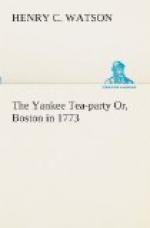“No flattery, Pitts,” returned Mr. Kinnison. “My memory ’s bad enough, and as for taking such a bold part in that tea-party, it’s all nonsense. If there was a leader, you was the man. But I’ll tell these young men all I know of the affair, and what the Lebanon Club had to do with it.”
“Take some of this beef, Mr. Brown?” interrupted Hand.
“Much obliged, sir, but beef is rather too tough for my gums,” replied the old fifer. “I’ll try something else.” Mr. Kinnison went on with his narrative.
“Well, the seventeen men of our club determined, whether we were aided or not, to destroy the tea which the East India Company had sent to Boston. The plan was soon formed, as it always is when men are determined to do a thing. We wanted no captain—each man could command for himself. We resolved to disguise ourselves in Mohawk dresses, and carry such arms as would enable us to sell our lives pretty dearly; we also pledged ourselves never to reveal the names of any of the party while there was danger in it. We expected to have a fight anyhow, and the first man who faltered was to be thrown overboard with the tea. We came to Boston and found the people ripe for the deed. A great meeting was to be held at the old South Meeting-house, and we concluded to wait and see what would be done there. We lodged at this tavern, and held our councils up in this room. Well, there was a tremendous meeting at the Old South, and most of us were there to help to keep up the excitement, and to push our plan if a chance appeared. Young Quincy made a speech that stirred the people, and made them ready for anything which would show their spirit. The people voted with one voice that the tea should not be landed. We saw how things were going, came back to the tavern, put on our Mohawk dresses, and returned to the meeting. Pitts succeeded in getting into the church just about dusk and raising the war-whoop. We answered outside. Then Pitts cried out, ’Boston harbor a tea-pot to-night!’
“Ay,” exclaimed Pitts, brandishing his knife above his head, “and ’hurra for Griffin’s Wharf!’”
“The crowd echoed Griffin’s Wharf,” continued Kinnison, “and hurried towards that place. Our men joined together, returned to the tavern, got our muskets and tomahawks, and collected about seventy men together, armed with axes and hatchets. Then we pushed for the wharf where the East Indiamen, loaded with the tea, were lying. Let me see!—The ships were called the Dartmouth, the—”
“The Eleanor, and the Beaver,” prompted Colson.
“Ay, the Dartmouth, the Eleanor, and the Beaver,” continued Kinnison. “You see, my memory ’s weak. Well, when we reached the wharf, there was a crowd of people near it. It was a clear, moonlight night, and the British squadron was not more than a quarter of a mile distant—so, you see, there was a little risk. We didn’t halt long. Pitts led the way on board the Dartmouth, and we followed, musket and tomahawk in hand.




